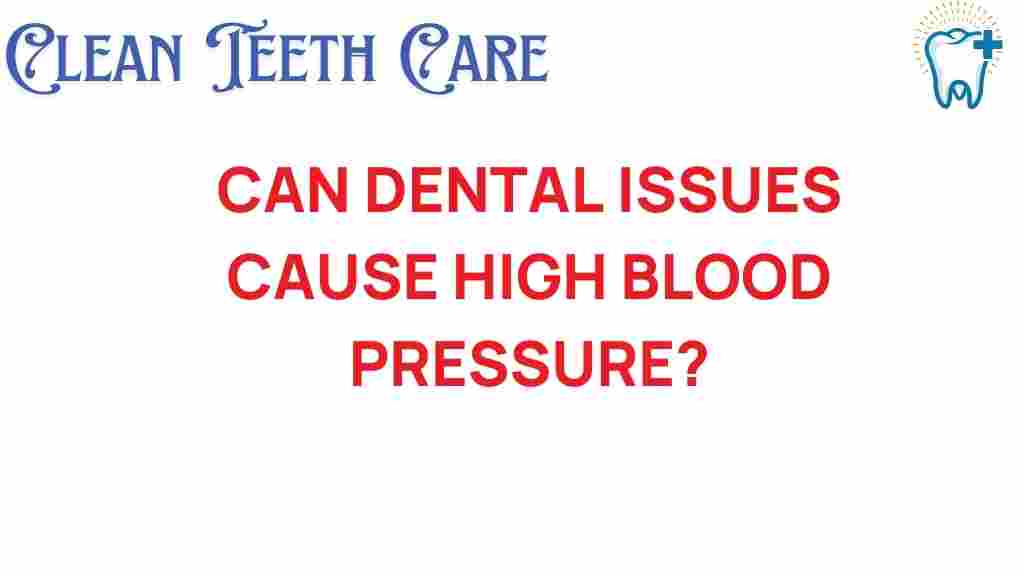Unraveling the Link: Can Dental Issues Drive Up Blood Pressure?
Maintaining good dental health is not just about having a bright smile or fresh breath; it could also play a significant role in your overall health, particularly in relation to high blood pressure. Recent studies suggest that there may be a connection between poor oral hygiene and increased risks of cardiovascular issues, including hypertension. In this article, we will explore the links between dental health and high blood pressure, the role of inflammation, and the importance of preventive care.
The Connection Between Dental Health and High Blood Pressure
The relationship between dental health and cardiovascular health is complex but increasingly recognized in the medical community. Here are some key points to consider:
- Gum disease: Chronic gum disease (periodontitis) can lead to systemic inflammation, which may contribute to high blood pressure.
- Inflammation: Inflammation caused by poor oral hygiene can affect blood vessels, leading to hypertension.
- Health connections: Poor oral health is associated with various systemic diseases, including diabetes and cardiovascular disease.
Understanding Gum Disease and Its Effects
Gum disease is an infection of the tissues that surround and support your teeth. It often begins with gingivitis, characterized by red, swollen gums that can bleed easily. If left untreated, gingivitis can progress to periodontitis, a more severe form of gum disease that can damage the soft tissue and destroy the bone that supports your teeth.
Research indicates that individuals with periodontitis may have higher levels of inflammatory markers in their blood, which can contribute to high blood pressure. The inflammation from gum disease can lead to the following:
- Increased arterial stiffness
- Higher levels of C-reactive protein (CRP)
- An elevated risk of cardiovascular disease
How Inflammation Impacts Blood Pressure
Chronic inflammation is a significant factor in many health conditions, including high blood pressure. Here’s how inflammation can affect your cardiovascular health:
- Blood vessel function: Inflammation can damage the cells that line blood vessels, leading to dysfunction.
- Vascular resistance: Inflammatory cytokines can increase vascular resistance, causing the heart to work harder.
- Blood clotting: Inflammatory markers can promote blood clot formation, which may lead to heart attacks or strokes.
Preventive Care: The Key to Good Oral and Overall Health
To reduce the risk of high blood pressure and other cardiovascular issues, it is essential to maintain proper oral hygiene and address any dental problems promptly. Here are some preventive care tips:
- Regular dental check-ups: Visit your dentist at least twice a year for cleanings and examinations.
- Daily brushing and flossing: Brush your teeth at least twice a day and floss daily to remove plaque and prevent gum disease.
- Healthy diet: Consume a balanced diet rich in fruits, vegetables, whole grains, and lean proteins while limiting sugary and processed foods.
- Avoid tobacco: Smoking and chewing tobacco can worsen gum disease and increase cardiovascular risk.
- Manage stress: Stress can be a significant contributor to both poor dental and cardiovascular health. Engage in relaxation techniques such as yoga or meditation.
Step-by-Step Guide to Improving Dental Health
To effectively improve your dental health and potentially lower your high blood pressure, follow these steps:
- Establish a Routine: Create a daily oral hygiene routine that includes brushing, flossing, and rinsing with an antibacterial mouthwash.
- Monitor Your Diet: Incorporate foods that promote oral health, such as dairy products, crunchy fruits, and vegetables.
- Stay Hydrated: Drink plenty of water to help wash away food particles and bacteria.
- Limit Sugary Foods: Cut back on sweets and acidic foods that can lead to tooth decay and gum disease.
- Seek Professional Help: If you notice signs of gum disease, such as persistent bad breath, swollen gums, or bleeding, consult your dentist immediately.
Troubleshooting Common Dental Issues
Sometimes, despite our best efforts, dental issues can arise. Here are some common problems and their solutions:
- Bad Breath: This can be caused by bacteria in the mouth. Ensure you’re brushing your tongue and using mouthwash. If the problem persists, consult your dentist.
- Bleeding Gums: This could be a sign of gum disease. Increase your oral hygiene practices and schedule a dental visit.
- Tooth Sensitivity: If you experience sensitivity, consider using a toothpaste designed for sensitive teeth and consult your dentist for further advice.
Conclusion
The connection between dental health and high blood pressure is an important aspect of overall health that should not be overlooked. Maintaining good oral hygiene and managing gum disease can reduce inflammation and potentially lower your cardiovascular risk. By prioritizing preventive care and regular dental visits, you can help ensure that your teeth and gums remain healthy, which in turn can support better blood pressure management.
If you’re looking for more information on the health connections between dental care and overall wellness, check out this comprehensive guide. For additional resources on managing high blood pressure, visit the American Heart Association.
This article is in the category Conditions and created by CleanTeethCare Team
